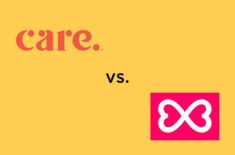Overview & Key Points
It’s cute to watch young kids recite the ABCs, count things with the few numbers they know, or repeat nursery rhymes. As your little one continues to learn and reach new milestones, you might wonder if it’s time for them to be in preschool. What are the benefits of preschool, and is it only for academic learning?
Preschool age is from 3 to 5 years old. Many kids begin their academic journey at this age. Early learning is important because it lays the foundation for your child’s lifelong success. (1)
Early childhood education is important. It’s considered one of the three essentials of healthy child development. The other two are family (or home environment) and health or well-being. (1)
Studies have shown that children who went through preschool programs performed better in math and reading in kindergarten. (1)
The academic advantage isn’t just short-term. Studies also showed that these kids have a higher chance of academic success through elementary, high school, and adolescence. (1)(2)(3)
More importantly, quality preschool education isn’t just about academics. It also covers emotional, social, and health aspects. This is significant because, according to child experts, mental health has close links with both socioemotional aspects and health. (2)
Preschool education can give your child a head start for a successful future. (1)(2)(3)
How do you know your three-year-old is ready for preschool? How do you find the right preschool or pre-k program to meet your child’s needs? How can you prepare your child for their first day of school? Can you plan for preschool even if your child is still a baby?
Keep reading to find answers to these questions below.
Important Terminologies & Schedules For Preschoolers
What’s the Difference: Preschool Vs. Pre-K?
The classification varies, depending on your location and what the school uses. However, many states and schools use the following: (4)
- Daycare and playgroups – For 0 to 2.5 years old
- Preschool – For 2+ to 4 years old
- Pre-K (pre-kindergarten) – For 4 to 5 years old
Most preschool and pre-K programs only offer half-day classes. However, some also provide full-day activities. They often follow the same school year calendar as classes for older children. (4)
Aside from age differences, pre-K programs usually have structured math, writing, and reading activities. They’re usually more advanced than those for younger preschool children. (4)
Similarities of preschool and pre-K programs:
- Help develop school readiness skills
- Promote social-emotional skills development
- Use playtime to help young children learn new skills (e.g., problem-solving, fine motor skills, coordination, etc.)
What Age Is Pre-K In California?
- For 4-year-olds (5)
What Age Is Pre-K In NJ?
- For 3 or 4-year-olds (6)(7)
- Some school districts, such as Newark, offer full-day classes (6 hours)
Can You Plan For Preschool If Your Child Is Still A Baby?
Yes. You can start scouting for the best preschools in your area anytime. However, you do have to postpone enrollment until your child reaches the right age.
Public Preschools
In the US, low-income families can send their children to free preschool through the Head Start program. It’s available in all 50 states and US territories. Aside from early childhood education, the program also covers child health and nutrition. (2)
Top Benefits Of Being In Preschool
Learning & Improving Social Skills
Preschool helps your child learn and improve their social-emotional skills. (2)
Problems in children’s social skills have links with challenging behavior. They can also lead to social issues, such as trouble getting along with peers, and even affect early learning. (2)
Benefits of resolving these socioemotional difficulties during early childhood: (2)
- School adjustment and success
- Vocational (and work) adaptation through adulthood
- Reduced problems with socialization
- Better self-regulation
Cognitive Development & Learning Other Skills
Academic learning and cognitive development are among the most important aspects of education for preschool-aged children. During preschool, they learn the foundations of language, math, and reading. (1)(2)(3)
While these cognitive skills continue to develop through the years, the strong foundations from early childhood can last through your child’s adult years. (1)(2)(3)
Cognitive development also helps promote self-regulation and emotional skills. (2)
Preschool programs also help children learn different skills, including: (2)
- Oral language skills, such as alphabet letters and sounds, basic grammar, vocabulary, syntax, word meanings, and pragmatics (appropriate use of words depending on context)
- Literacy skills and reading
- Fine motor skills
- Creativity and imagination
- Early math skills
- Problem solving
Learning In A Structured Environment & Academic Preparation For Life
Preschool helps your child get ready for kindergarten and “big school.” While 5-year-olds also learn the basic lessons (e.g., letters, numbers, etc.) in kindergarten, preschool gives them a head start and helps them perform better in class. (1)(2)(3)
Studies have shown that this even goes beyond kindergarten.
For example, a 2016 Developmental Psychology study showed that children who spent more hours in a high-quality preschool had higher academic grades and class rank. They were also more likely to be accepted into more selective colleges. (8)
The study also found that females with more preschool hours had greater impulse control. They’re less likely to do risky behaviors. (8)
Researchers believe that the academic benefits of preschool are long-term because they make kids more prepared to learn in school. (3)
Promotes Physical Activity
Studies have shown that physical activity improves a child’s health and promotes better academic performance. (2)
The AAP (American Academy of Pediatrics) and IOM (Institute of Medicine) recommend moderate to rigorous physical activity of at least 60 minutes daily. Sadly, studies have also shown that less than half of children meet these recommendations. (2)
Preschools promote physical activity through playtime and recess. (2)
Fosters Independence
Children are taught self-reliance in preschool. This helps promote cognitive learning without relying on caregivers for help. (2)
What Is The Best Age To Start Preschool?
While preschool can start as early as 2+ years old, kids develop and learn at their own pace. The best age for them to start preschool is when they’re ready.
Are Kids Required To Attend Preschool?
No. Preschool isn’t required. Your child can start formal education with kindergarten at around 4 or 5 years old.
Can Your 2-Year-Old Go To Preschool?
It depends on on the school. Some preschools accept kids who are 2.5+ years old, but others might recommend daycare or playgroup programs until they reach the minimum age.
Is Your 3-Year-Old Ready For Preschool?
Possibly. Note, however, that age isn’t the only indicator of preschool readiness. Here are some aspects to consider (discussed below):
- Physical development and milestones
- Communication and language skills
- Listening skills and comprehension (following directions)
- Social and emotional development (playing with others)
- Potty training readiness
- Understanding and dealing with separation anxiety
- Nap length and schedule
- Persistence and trying
- Curiosity and imagination
- Understanding routines and transitions
Kids develop at their own pace. So, it’s not surprising that some might show readiness at 2+ years while others need more time.
In some cases, however, these delays might be due to learning disabilities, such as dyslexia (reading difficulties) and dysgraphia (writing difficulties). Kids with these problems might need enrollment in special schools or seek intervention to help address their situation. (discussed below) (9)(10)
Developmental Milestones & Signs Your Child Is Ready For Preschool
Physical Development & Milestones
Some aspects of physical development relevant to preschool: (2)
- Fine motor skills
- Gross motor skills
- Vision and hearing
- Speech
Cognitive development goes together with physical development. Child development experts agree that progress in one aspect often relies on the other. This means that your child needs to be physically ready for preschool to learn. (2)
Fine Motor Skills For Preschoolers
3-Year-Olds
Your child might be ready for preschool by the time they learn to use a fork, start getting interested in writing, and begin to tie their shoelaces. (2)
According to the CDC (Centers For Disease Control And Prevention), most 3-year-olds know how to put on clothes by themselves. (11)
Other signs of fine motor skills development: (12)
- Draws straight lines
- Copies or draws a circle
Studies show kids with fine motor skills deficiencies might have lower verbal and math scores. In contrast, kids with highly developed fine motor skills are more ready for preschool. They might also be more successful in the future. (2)
Many schools require certain motor skills to gauge your child’s readiness. They might conduct tests or assessments before enrollment. (2)
4-Year-Olds
Signs of preschool readiness and fine motor skills development milestones: (13)
- Draws basic shapes (e.g., a circle and square)
- Draws a person (might be a stick figure) with three distinct body parts
- Fastens large buttons without assistance
- Pulls zippers to close or open
- Writes some letters and numbers
5-Year-Olds
Some fine motor skills by this age: (13)
- Draws a triangle and diamond
- Draws a person (can still be a stick figure) with six body parts
- Uses scissors
- Learns to tie their shoelaces (if they haven’t learned this earlier)
- Writes their first name
Gross Motors Skills, Balance, Coordination, & Movement Of A Preschooler
3-Year-Olds
Expectations for this age: (12)
- Stands on tiptoes
- Jumps easily
- Runs with ease
- Walks up the stairs without assistance
- Throws or kicks a ball
- Rides a tricycle or bicycle
4-Year-Olds
Expectations for this age: (13)
- Hops and skips on one foot
- Builds block towers (around 10+ blocks)
- Throws and catches a ball overhand
- Walks down the stairs without assistance
5-Year-Olds
Expectations for this age: (13)
- Walks backwards without tripping
- Plays jump rope
Curiosity, Imagination, Communication, & Language Skills
Preschools usually require children to have basic communication skills appropriate for their age. These skills are essential for learning and participating in class activities.
3-Year-Olds
Expectations for this age: (12)
- People outside the family can understand their speech
- Vocabulary of around 500 to 900 words
- Creates sentences using 2-3 words and progresses to 4-5 words
- Constantly asks, “Why?”
- Knows basic colors
- Knows “thank you” and “please”
- Knows and refers to themselves using their own name
4-Year-Olds
Expectations for this age: (13)
- Makes sentences with 4-5 words
- Constantly asks questions (other than “why?”)
- Likes telling stories
- Repeats words they regularly hear
5-Year-Olds
Expectations for this age: (13)
- Makes sentences with 6-8 words
Listening Skills & Comprehension (Following Directions)
Kids need to have listening skills to help them understand their lessons and follow directions for class activities. Their listening skills can also impact their writing and reading abilities in the long term. (2)
3-Year-Olds
Expectations for this age: (12)
- Understands and follows simple instructions
4-Year-Olds
Expectations for this age: (13)
- Obey simple instructions
- Follows rules but might not understand right from wrong
5-Year-Olds
Expectations for this age: (13)
- Understands and follows more complicated or multiple instructions
What Do Preschoolers Understand?
3-Year-Olds
Kids this age can understand: (12)
- Long sentences
- Past tense (e.g., previous day)
- Size differences
- Prepositions (e.g., behind, under, on, in, etc.)
- Pronouns
- Number concepts (e.g., knows how to count around four or more objects)
- Problems and solutions
4-Year-Olds
Expectations for this age: (13)
- Difference between reality and fantasy
- Concept of time
- Awareness of other people around them
5-Year-Olds
Expectations for this age: (13)
- Better understands time concepts
- Better understands reality vs. fantasy
- Shows curiosity about facts and real things
- Understands rules and might compare differences (e.g., your rules vs. rules of friends’ parents)
Child’s Health
Head Start data shows that preschool can lead to the following long-term positive health outcomes: (2)
- Reduced risks of obesity at 12-13 years old
- Fewer incidence of behavioral problems (e.g., less involvement in criminal activity as adolescents)
- Prevention (or delay) of physical and emotional problems
- Reduced rates of health problems such as metabolic syndrome, obesity, and hypertension
Poor health can, however, affect your child’s learning, academic performance, and social skills. That’s why the Head Start program in the US also covers children’s health and nutrition, aside from providing free preschool education. (2)
When your child is sick, they can’t concentrate in school. If they have a fever, they might also be turned away because other children might also be affected. (2)
Talk to your pediatrician about your child’s readiness for school if they have a medical condition. You might need to postpone preschool or find alternative learning methods, such as homeschooling.
In some cases (e.g., iron deficiency anemia), your child can attend preschool while undergoing treatment for the condition. (2)
Social & Emotional Development (Playing With Others)
Learning in a group requires social skills. Parallel play is common for toddlers. Your child might be ready for preschool once they begin to share toys and play with other kids. (12)
3-Year-Olds
Expectations for this age: (12)
- Takes turns
- Starts to share
- Plays with other children
- Learns to show their feelings with fewer temper tantrums and in more “socially acceptable ways”
4-Year-Olds
Expectations for this age: (13)
- Shows independence and want to do things on their own
- Starts to share, but might still feel selfish or unwilling to share
- Shows moodiness, including aggressiveness
- Plays with other kids
- Might have imaginary friends
- Threatens or tries to “run away”
5-Year-Olds
Expectations for this age: (13)
- Knows good manners
- Feels happy and eager to please others
- Usually gets along well with their parents
Potty Training & Readiness
Some schools require kids to be potty trained, while others don’t. Check the school’s policy before enrollment.
3-Year-Olds
Expectations for this age: (12)
- Shows readiness or already potty trained (uses a potty chair or the toilet)
4-Year-Olds & 5-Year-Olds
Expectations for these ages: (13)
- Most kids are potty trained by ages 4 and 5
Understanding & Dealing With Separation Anxiety
Kids need to spend at least a few hours away from you when they’re in preschool. It can lead to separation anxiety. Many kids will likely cry, throw tantrums, and refuse to enter their classroom.
Regularly talk to your child about preschool, and encourage them to play with other kids. Help them understand that you love them and support them even when you aren’t physically by their side. (12)(13)
Preschool teachers understand separation anxiety and can help you deal with the situation.
Nap Length & Schedule
Many kids already skip their naps by preschool age. Your child might not be ready for preschool yet if they still go on long naps. You might also consider picking a morning class schedule if they’re used to long afternoon naps.
3-Year-Olds
Expectations for this age: (12)
- Sleeps 11-13 hours a day, including naps
- Might still take afternoon naps, but others might already skip them at this age
4-Year-Olds & 5-Year-Olds
Expectations for these ages: (13)
- Around 10-12 hours of sleep a day
- Many kids skip naps by 4-5 years old
Persistence, Concentration, & Trying
Kids need to do tasks and participate in class activities. Their attention span matters. It can affect their concentration and persistence in the tasks. The following are expectations for each age group: (14)
3-Year-Olds
- Around 6-8 minutes
4-Year-Olds
- Around 8-12 minutes
5-Year-Olds
- Around 12-18 minutes
What To Do If Your Child Isn’t Ready For Preschool
Remember that preschool isn’t a requirement for kindergarten or grade school. You can encourage your child to try it and possibly arrange a school visit. But if they aren’t ready, waiting another year before trying is likely okay. It’s also alright to skip preschool and enroll them in kindergarten when the time comes.
What If Your Child Can’t Go To Preschool?
Don’t worry – your child isn’t doomed for life if they missed preschool. They can catch up during kindergarten even if they don’t have any preschool experience. (2)
Helping Your Child Transition To Preschool
- Take them for a school visit and talk with their preschool teachers
- Let them pick their bag for school
- Talk to them about what they can do at preschool (e.g., have new friends, learn something new, etc.)
- Read them books about getting ready for preschool
Some of our book recommendations:
- Preschool, Here I Come!

- This Is How We Get Ready

- Maisy Goes to Preschool

- The Night Before Preschool

- Open the Preschool Door

- Pete the Kitty’s First Day of Preschool

Learning Disabilities & Communication Problems
Learning disabilities aren’t intellectual issues, sensory impairments, or emotional problems. Still, they can affect your child’s preschool readiness. Some kids with learning disabilities might need special curriculums for learning. (9)(10)
- Dyslexia – Reading difficulties
- Dysgraphia – Writing difficulties
- Dysphasia or aphasia – Language difficulties
- Dyscalculia – Math difficulties
- Dyspraxia – Fine motor skills difficulties
- Visual processing disorder – Can see but have difficulty processing or interpreting visual information
- Auditory processing disorder – Can hear but have difficulty differentiating between sounds
Note, however, that most kids may experience some form of learning-related troubles at some point. This doesn’t mean they have learning or intellectual disabilities.
When To See Your Pediatrician
Signs of possible communication problems: (13)
- Regular stuttering
- Unclear speech
- Trouble creating simple sentences (based on expected milestones for their age)
- Slow vocabulary improvement
- Can’t hold conversations
- Can’t understand or follow simple instructions
- Don’t ask or answer questions
- Appears to have hearing problems
Choosing A Preschool For Your Child
Do Preschools Need To Have A Child Care License?
Different states have varied licensing requirements. Generally, a license isn’t required if the preschool: (15)
- Only operates online
- Provides care only for one family
- Provides care only for one day a week
However, a childcare license is required for typical preschools handling several children a few hours a day, several days a week. (15)
Qualified & Compassionate Preschool Teachers
Different states also have varied requirements for teachers. Some require educational training or background, while others are fine with at least a high school education. (15)
We recommend visiting your prospective preschool and talking with the teachers to learn more about their programs, licenses, and qualifications. You can also check if the facility looks like a safe and fun environment for your preschooler.
Are There Free Preschools?
Yes. All states have a Head Start program that provides free preschool education. (2)
Does Preschool Have Disadvantages?
Maybe. Some studies have also shown that preschool might also have some negative effects.
For example, a 2018 Journal of Educational Psychology study showed that kids who spent 20+ hours per week at preschool might have “less optimal psychosocial skills” than those who spent fewer hours. (3)
“Fadeout” can also happen wherein kids with a strong preschool background make fewer gains than those without a preschool. (3)
Also, catch-ups can happen, putting them at the same level as kids who never had preschool experience. (3)
Still, even with these, we recommend preschool for your child. It can be a fun learning experience. The long-term positive effects may outweigh these negative effects. After all, studies have also shown that the “sleeper effect” can happen: a child shows significant benefits to preschool programs later in life (even if they don’t exhibit this right after preschool). (3)
Keeping Your Preschooler Safe & Promoting Healthy Bodies
Sleep For Preschoolers
- 3-year-olds: Around 11-13 hours a day, including naps (12)
- 4-year-olds and 5-year-olds: Around 10-12 hours of sleep a day (13)
Reduced Screen Time For Preschoolers
The AAP (American Academy of Pediatrics) discourages screen time and limits it to around 1 hour per day for ages 2-5 years old. (16)
Car Seat Reminders For Preschoolers
The NHTSA (National Highway Traffic Safety Administration) recommends keeping your child in a rear-facing car seat for as long as possible or until they reach the manufacturer’s recommended height and weight limits. (17)

Your Child’s Ages & Stages
- Prenatal
- Toddler: 1-3 years old
- Preschool: 3-5 years old
- Gradeschooler: 5-12 years old
- Teen: 13-18 years old
- Young Adult: 18-21 years old
Other Resources For Preschool Parents
- Preschool development
- Effective parenting tips
- Gentle parenting
- Positive parenting tips
- Realistic parenting tips
REFERENCES
(1) https://www.ncbi.nlm.nih.gov/pmc/articles/PMC8130793/
(2) https://www.ncbi.nlm.nih.gov/books/NBK310550/
(3) https://www.ncbi.nlm.nih.gov/pmc/articles/PMC6426150/
(4) https://www.brighthorizons.com/resources/article/preschool-vs-pre-kindergarten-what-is-the-difference
(5) https://www.cde.ca.gov/eo/in/ts-universalprek.asp
(6) https://www.nps.k12.nj.us/departments/early-childhood/pre-k-registration/
(7) https://www.mendhamtwp.org/elementary-school-home/registration/pre-kindergarten-34
(8) https://pubmed.ncbi.nlm.nih.gov/27690496/
(9) https://ldaamerica.org/advocacy/lda-position-papers/what-are-learning-disabilities/
(10) https://www.helpguide.org/articles/autism-learning-disabilities/learning-disabilities-and-disorders.htm
(11) https://www.cdc.gov/ncbddd/actearly/milestones/milestones-3yr.html
(12) https://choc.org/primary-care/ages-stages/3-years/
(13) https://choc.org/primary-care/ages-stages/4-to-5-years/
(14) https://www.cnld.org/how-long-should-a-childs-attention-span-be/
(15) https://preschool.org/preschool-license/
(16) https://www.mayoclinic.org/healthy-lifestyle/childrens-health/in-depth/screen-time/art-20047952
(17) https://www.nhtsa.gov/sites/nhtsa.gov/files/documents/carseat-recommendations-for-children-by-age-size.pdf












